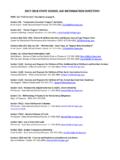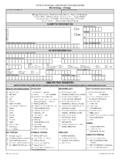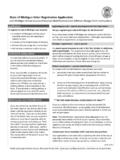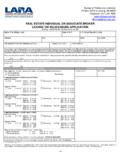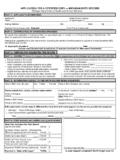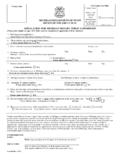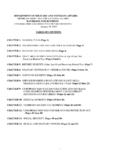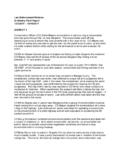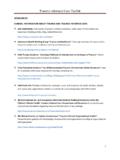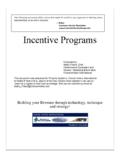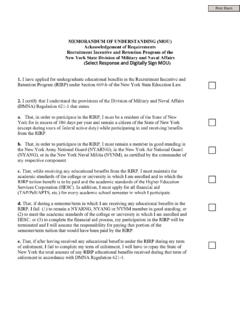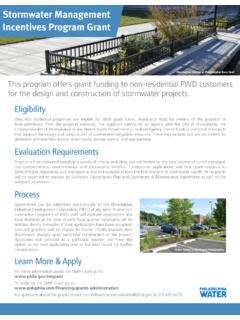Transcription of Tuition Incentive Program - michigan.gov
1 michigan Department of Treasury 3981 (Rev. 08-17) Description The Tuition Incentive Program (TIP) encourages eligible Medicaid recipients to complete high school by providing Tuition assistance for college. TIP provides assistance in two phases. Phase I is applied to standard in-district Tuition and mandatory fees charged to eligible students enrolled in a credit-based or minimum one year certificate Program or associate degree at a participating michigan community college, public university, degree-granting, non-profit independent college, federal tribally-controlled college, or Focus: HOPE. Phase II provides a maximum of $2,000 total Tuition assistance for credits earned in a four-year Program at an in-state, degree-granting college or university. Award parameters are subject to legislative changes. Application Students who have (or have had) Medicaid coverage1 for 24 months within a 36-consecutive month period prior to high school completion will be identified by the michigan Department of Health and Human Services (DHHS) as having met the Medicaid eligibility requirement.
2 Student Scholarships and Grants (SSG) will only accept certification by DHHS for Medicaid benefits received while in michigan . The 24 months of benefits out of a 36-consecutive month period may begin as early as age nine, though months of benefits will not be evaluated until at least the student s 12th birthday and continues to be evaluated until high school completion. After being identified as TIP eligible, SSG will send the student a notification to complete an application via the MiSSG Student Portal ( ) or by phone at 888-447-2687. The application must be completed before August 31 of the student s graduating year from high school or its recognized equivalent2. Students must also graduate (or its equivalent) before their 20th birthday3 to maintain TIP eligibility. SSG will send the student a reminder notification during their senior year of high school. The student is responsible for notifying SSG of any changes to address or college choice through the MiSSG Student Portal or by phone.
3 Starting with the class of 2017, students who attend an Early/Middle College have until age 21 to graduate and complete a TIP application, rather than age 20. Students in this situation must contact our office when completing the application. Eligibility To use Phase I or Phase II a student must: Complete the application no later than August 31 of the academic year in which the student graduates from high school or its recognized equivalent. Obtain a high school diploma or its recognized equivalent prior to age 203. Be a michigan resident as determined by institutional criteria. Be a citizen, permanent resident, or approved refugee. Not be incarcerated (does not include detention of a juvenile in a State-operated or privately operated detention facility). Not be in default on Federal/State student loan. Be enrolled at least half time. For Phase I, must be enrolled in certificate or associate degree Program and taking classes within Program of study.
4 TIP will not cover Tuition from courses outside of certificate or associate degree Program . For renewal, must meet institution s Satisfactory Academic Progress (SAP) policy. 1 January 1, 2016, MIChild became a Medicaid Program . MIChild benefits prior to January 1, 2016, cannot be counted as Medicaid coverage for TIP. 2 A student has until August 31 of the academic year in which his/her class graduates. 3 Students who attend an Early/Middle College have until age 21 to graduate and complete a TIP application. Students in this situation must contact our office to complete the application. Tuition Incentive Program Fact Sheet Academic Year 2017-18 3981, Page 2 Tuition Incentive Program Fact Sheet (continued) Program Limits, Phase I: Students must begin using TIP by enrolling at a participating college (see page 3) within four years of high school graduation. Eligibility ends six years from the date of high school graduation or its recognized equivalent.
5 Phase I covers the cost of Tuition at the standard in-district rate at participating michigan community colleges (see page 3). For persons not residing in a community college district, the out-of-district rate may be authorized. Tuition at the lower level resident rate is covered at participating michigan public universities. The amount that can be received at participating degree-granting, non-profit independent colleges, federal tribally-controlled colleges, or Focus: HOPE is $1064 per credit hour. Colleges and universities are limited to $ million in TIP reimbursements per academic year and are responsible for identifying who of their eligible students may be awarded TIP. Mandatory fees cannot exceed $250 per semester or term. Mandatory fees must be specified in the college s course catalog as mandatory for all students as a condition of enrollment. TIP benefits cannot exceed 80 semester or 120 terms credits (24 semester of 36 term credits per academic year).
6 Not all colleges and universities offer associate degree programs (see page 3). If the college or university does not offer such programs , students will not receive TIP assistance until they reach 56 credit hours. Students must be enrolled in a certificate or associate degree Program . TIP will only cover classes within a student s Program of study. Contact hours and tiered Tuition rates are not covered by TIP. Program Limits, Phase II: Phase II provides standard in-district Tuition and mandatory fee assistance not to exceed $500 per semester or $400 per term up to a maximum of $2,000 for credits earned in a four-year Program at a michigan degree-granting college or university. Phase II must be completed within 30 months of completion of Phase I requirements. Students can receive Phase II benefits without having received Phase I benefits. To receive Phase II benefits, the student must demonstrate the eligibility criteria for Phase I and have one of the following: 56 transferable semester or 84 transferable term credits.
7 A certificate (minimum of one year) or associate degree. Note: The Tuition Incentive Program is always considered last dollar unless a student graduated from a promise zone or if the student is also receiving a Fostering Futures Scholarship (FFS). Future awards are subject to available and approved funding. Summary of 2018-19 Program Changes Must file a current-year Free Application for Federal Student Aid (FAFSA) before the federal deadline. A TIP reimbursement s rate per credit (Phase I) at public universities may not exceed three times the average community college s in-district Tuition rate (established yearly). The private or independent post-secondary rate remains at the average community college in-district rate. For More Information Visit Contact the Tuition Incentive Program , Student Scholarships and Grants, toll free at 888-447-2687, e-mail or fax 517-241-5835. Box 30462, Lansing, MI 48909-7962. 4 Amount is based on the average community college in-district Tuition rate at participating michigan community colleges and is subject to legislative changes annually.
8 3981, Page 3 Tuition Incentive Program Fact Sheet (continued) Participating Institutions See the list below and note which institutions are Phase II ONLY prior to enrollment. Phase I ONLY Bay de Noc Community College Bay Mills Community College Delta College Glen Oaks Community College Gogebic Community College Grand Rapids Community College Kalamazoo Valley Community College Kellogg Community College Kirtland Community College Lake michigan College Lansing Community College Macomb Community College Mid michigan Community College Monroe County Community College Montcalm Community College Mott Community College Muskegon Community College North Central michigan College Oakland Community College Saginaw Chippewa Tribal College Saint Clair County Community College Schoolcraft College Southwestern michigan College Washtenaw Community College Wayne County Community College West Shore Community College Focus: HOPE Phase II ONLY Adrian College Albion College Alma College Andrews University Aquinas College Calvin College Central michigan University College for Creative Studies Eastern michigan University Grand Valley State University Hope College Kalamazoo College Kettering University Oakland University Olivet College Saginaw Valley State University Spring Arbor University University of Detroit Mercy University of michigan - Ann Arbor University of michigan - Dearborn University of michigan - Flint Walsh College Wayne State University Western michigan University Phase I and Phase II Alpena Community College Baker College Cleary University Compass College of Cinematic Arts Concordia University Cornerstone University Davenport University Ferris State University Finlandia University Grace Bible College Great Lakes Christian College Henry Ford College Jackson College Kuyper College Lake Superior State University Lawrence Technological University
9 Madonna University Marygrove College michigan State University michigan Technological University Northern michigan University Northwestern michigan College Northwood University Rochester College Sacred Heart Major Seminary Siena Heights University Community Colleges Eligible charges include standard in-district Tuition and mandatory fees. For persons residing in an area that is not included in any community college district, the out-of-district Tuition rate may be authorized. Some community colleges are authorized to offer bachelor s degrees. Contact your institution to see how this may impact your TIP eligibility. Public Universities Eligible charges include lower level resident Tuition and mandatory fees for the current year. Reminder: For Phase I, must be enrolled in certificate or associate degree Program and taking classes within Program of study. TIP will not cover Tuition from courses outside of certificate or associate degree Program .
10 Independent, Colleges, and Universities Eligible charges include mandatory fees for the current year and a per credit payment that does not exceed the average community college standard in-district per credit Tuition rate. Reminder: For Phase I, must be enrolled in certificate or associate degree Program and taking classes within Program of study. TIP will not cover Tuition from courses outside of certificate or associate degree Program .
